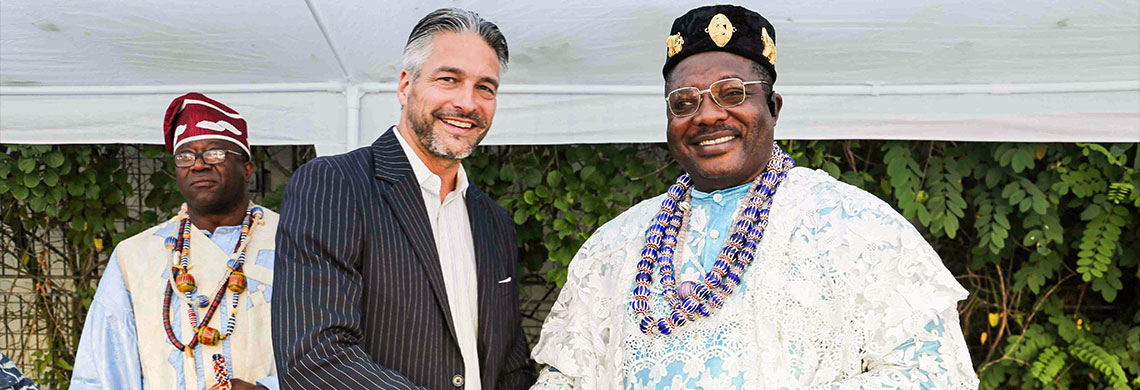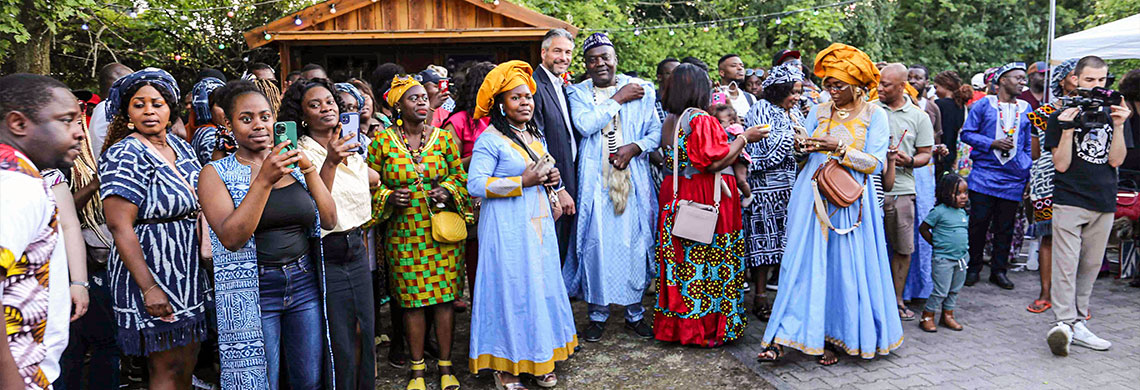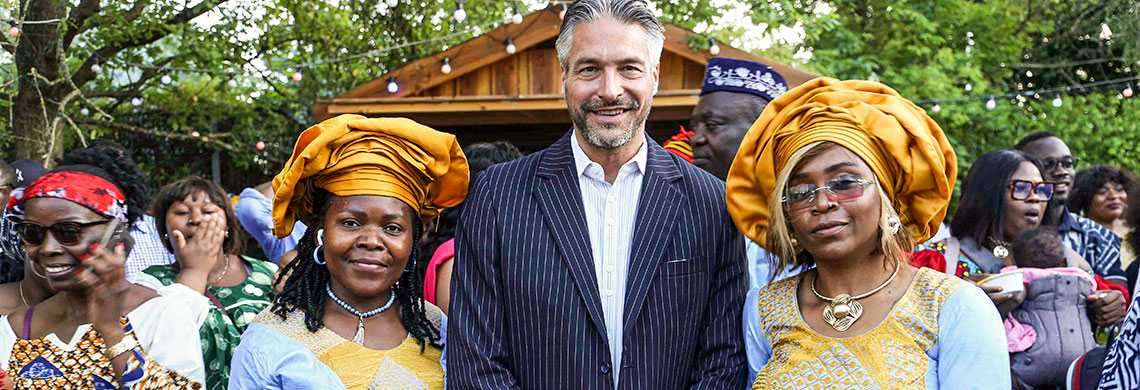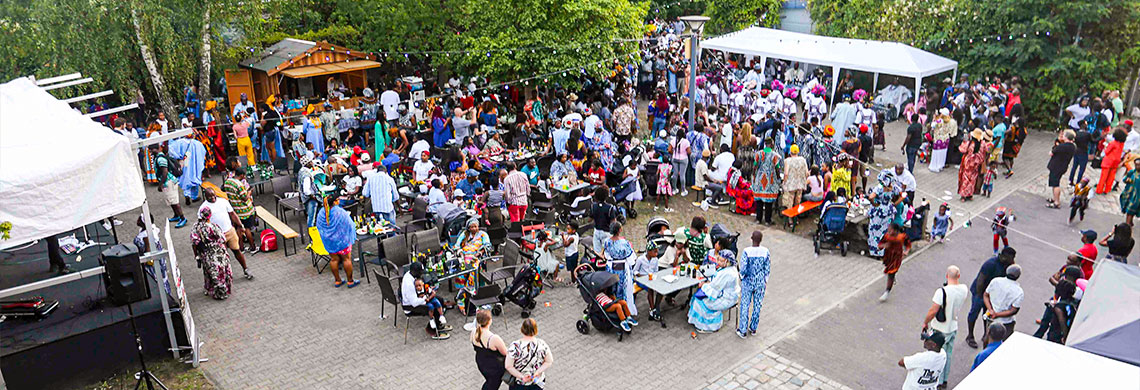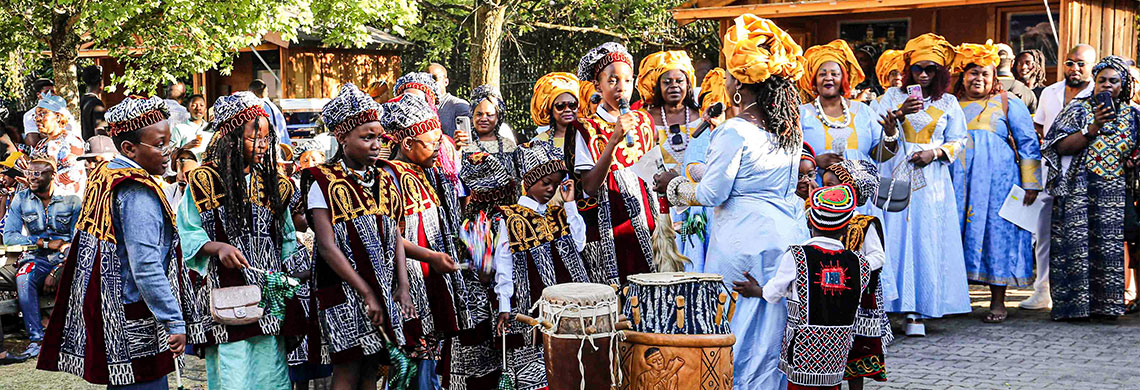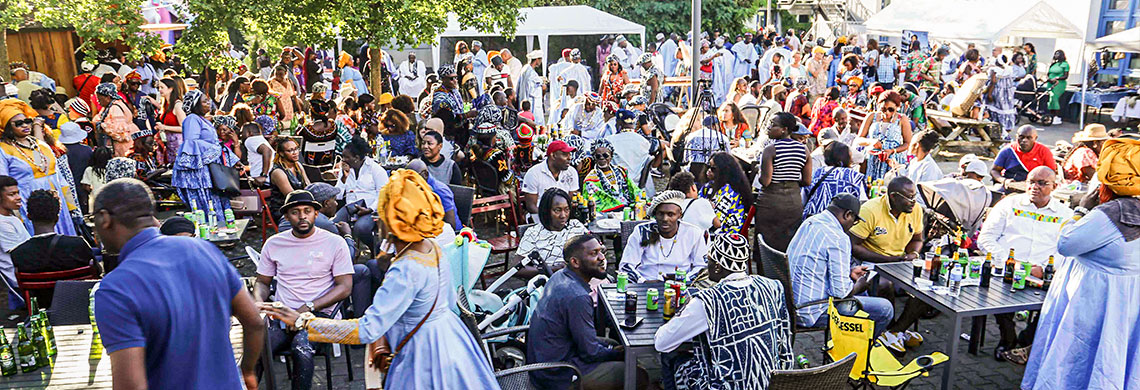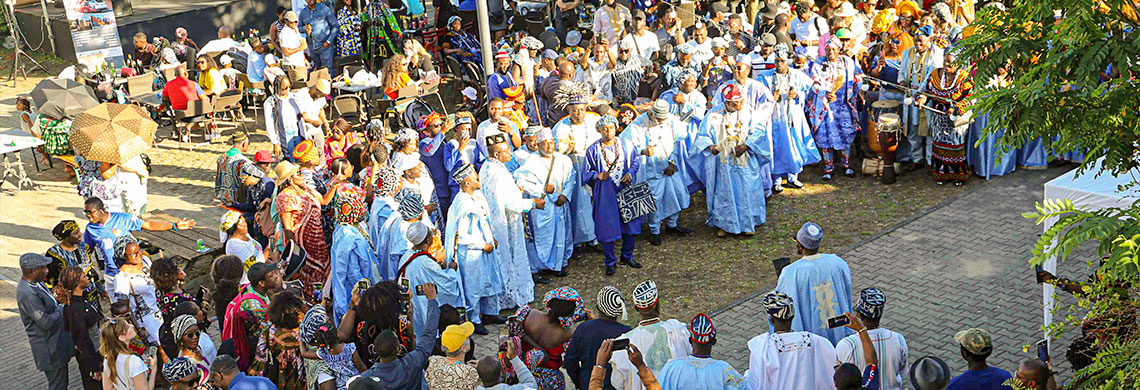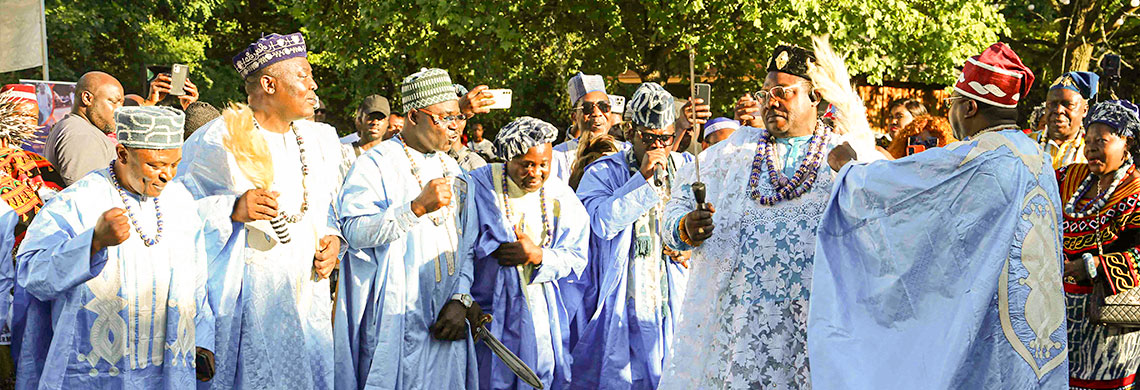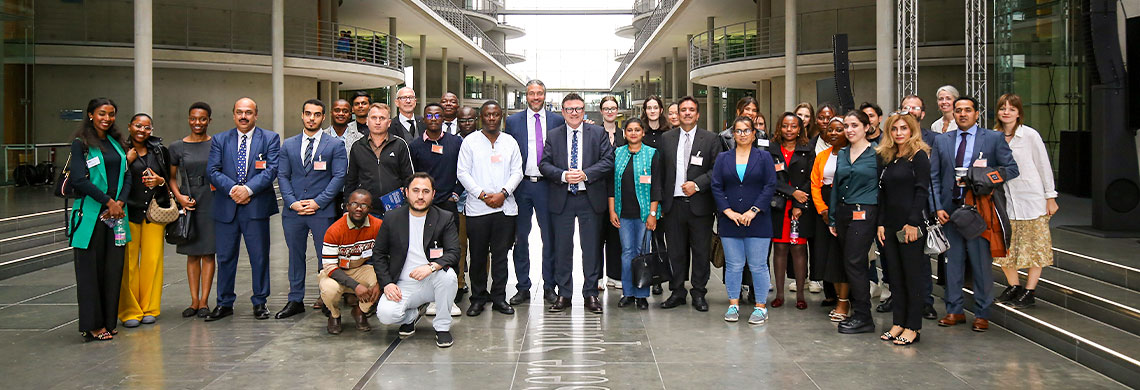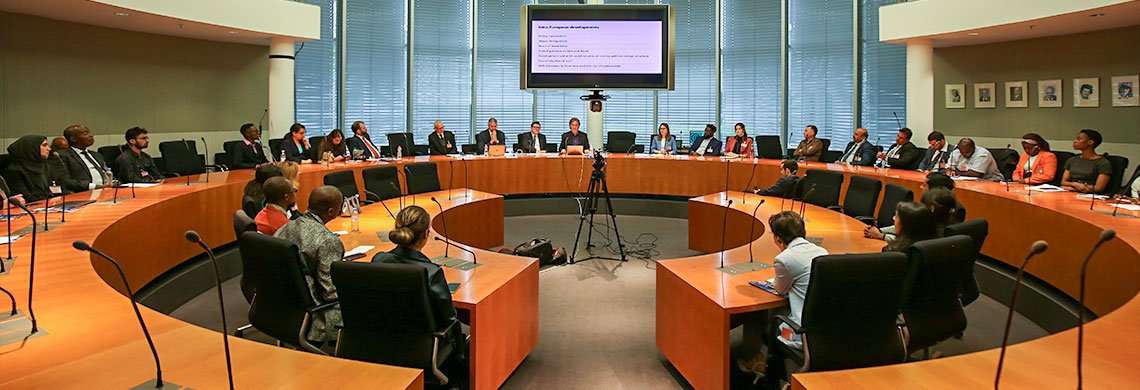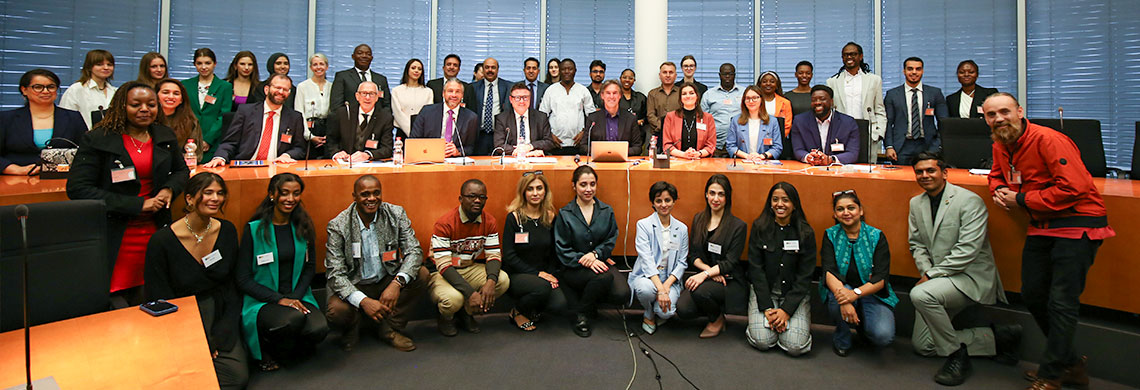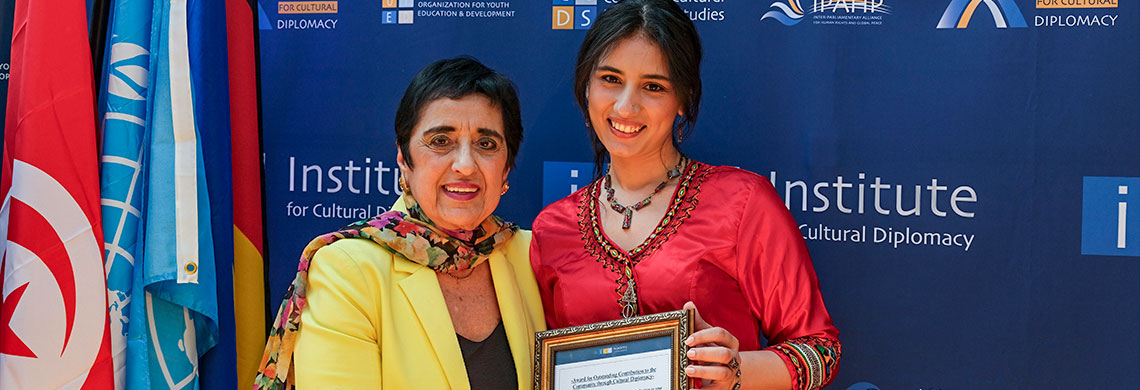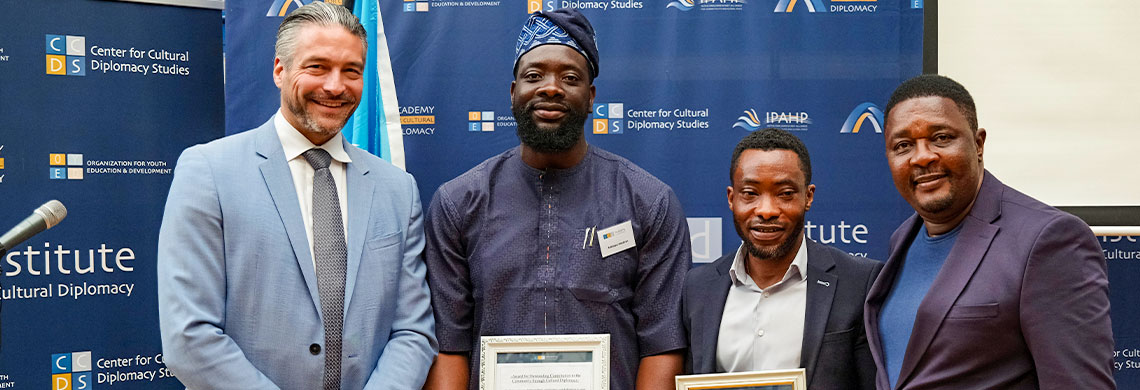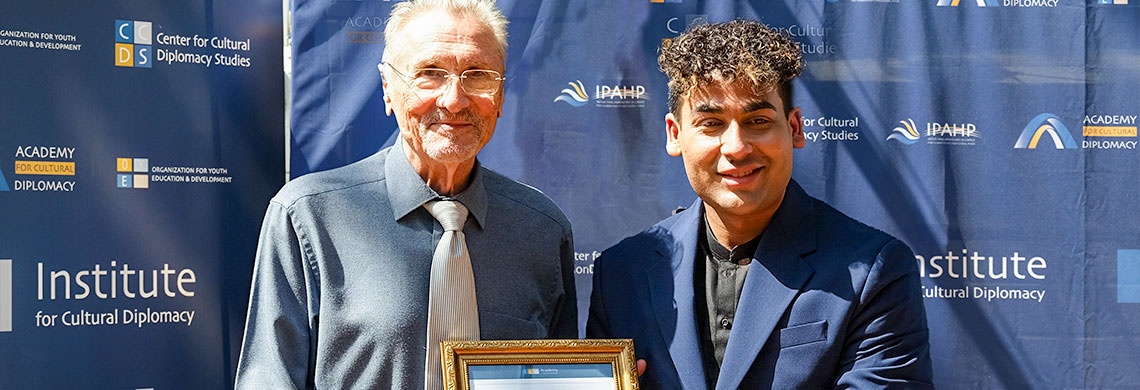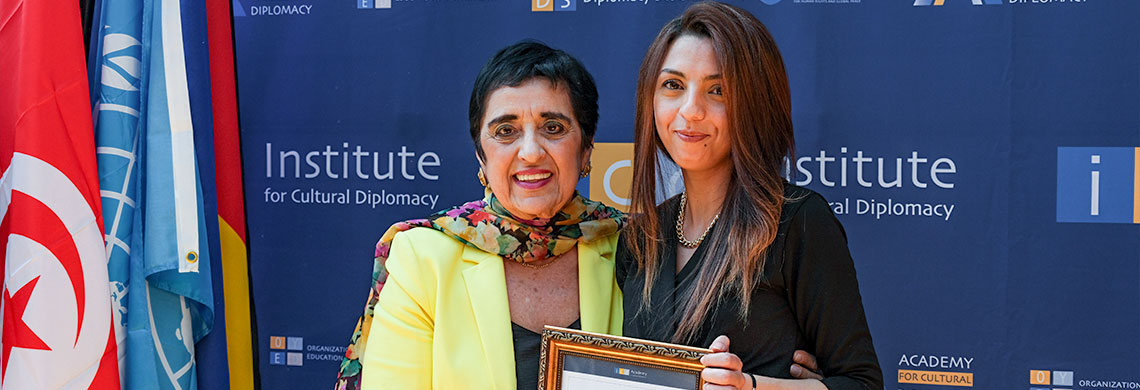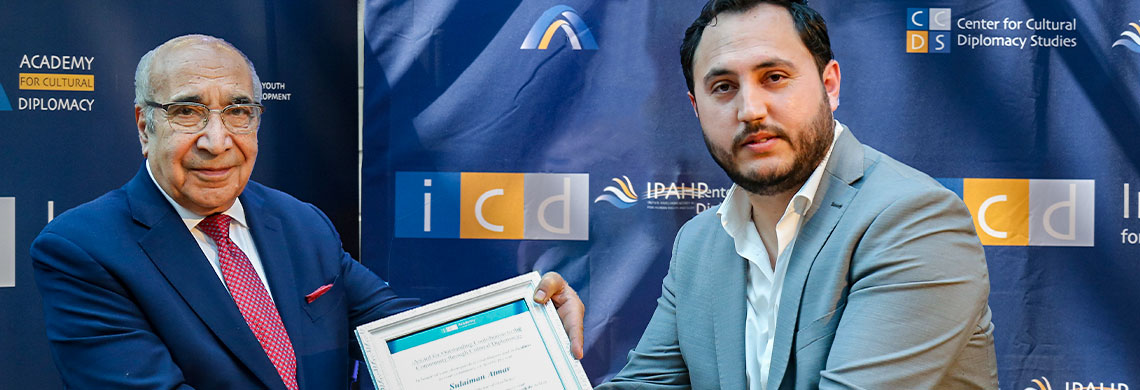Young Leaders´ Forums
The USA Meets Germany

Back Row (Left to right): Kilian Leon Moser, Melanie Junge, Daniel Engels, Adam Balogh, Ian Gregory Nelson, Markus Meirhofer, Michael Koeris, Predrag Djuranovic, Christian Wilbers, Steven Davis, Taylor Johnson, Justin Sikora -Middle Row (Left to right): Marina Staudt, Lukas V. Friedemann, Franziska Schuierer, Stephanie Smith, Teresa Streller, Marlen Meissner, Nina Menz, Carrie Worth, Karina Garibay, Carolin Weingart, Stephanie Bryson, Bettina Warburg-Johnson, Anna Geuchen, Rob Kiss Jr., Olivia Gilmore, Tony Deos, Katy White, Konrad Benjamin Siller, Lisa Guenther, Jameel Khan, Leslie Pendergast, Matthies Verstegen -Front Row (Left to right): Stephanie Sablich, Janine Tellinger, Amanda Pickett, Brenda Tuck, Ashley Webster, Silvia Petig, Trea Sweeny, Stefanie Schindler, Drew Facklam, Cassandra L. Stachniw, Anne Seitz, Livia Fischer
Forum Reports
Report of Day 1
An Introduction: Cultural Diplomacy in Germany (Workshops: Conflict Resolution & Stereotypes)
 The Berlin landmark of the Rotes Rathaus provided the perfect setting for Mark Donfried, Founder and Director of the ICD, to welcome the 46 participants of The US Meets Germany: A Forum for Young Leaders (USAMG). Mr. Donfried's opening words emphasised the importance of the bilateral relationship between the two countries and put into perspective the significance of the Forum. America and Germany share a special historical bond, a significant part of which has it roots here in Berlin. Since the end of the Cold War, however, funding for cross-Atlantic projects has been significantly reduced: There has been a dry spell in Cultural Diplomacy that, Mr. Donfried highlighted, needed addressing, "Relationships are not like light switches, you can't switch them on and off depending on your interests." Mr. Donfried concluded his introduction and handed the floor to Justin Sikora, Program Director for USAMG.
The Berlin landmark of the Rotes Rathaus provided the perfect setting for Mark Donfried, Founder and Director of the ICD, to welcome the 46 participants of The US Meets Germany: A Forum for Young Leaders (USAMG). Mr. Donfried's opening words emphasised the importance of the bilateral relationship between the two countries and put into perspective the significance of the Forum. America and Germany share a special historical bond, a significant part of which has it roots here in Berlin. Since the end of the Cold War, however, funding for cross-Atlantic projects has been significantly reduced: There has been a dry spell in Cultural Diplomacy that, Mr. Donfried highlighted, needed addressing, "Relationships are not like light switches, you can't switch them on and off depending on your interests." Mr. Donfried concluded his introduction and handed the floor to Justin Sikora, Program Director for USAMG.
"Emails are fun, but faces are better", began Mr. Sikora in his energetic style. He then proceeded to organise a simple game, which served as a fun icebreaker that associated names with hobbies. It gave the group a chance to get up from their seats and laugh. This informal introduction left everyone feeling more relaxed and ready for the fact-filled seminar that followed.
Mark Donfried, a professor at Humboldt University, began by offering an insightful introduction to cultural diplomacy and laid a solid foundation for the rest of the week. After a historic overview that brushed through several theories and analogies, he arrived to the present situation in which he affirmed that Germany is currently the world leader in the field of Cultural Diplomacy, both in terms of volume and quality. Germany does not aim to force ideas through its programs, but rather invite people to experience the German culture and build their own perception of it. This is what distinguishes it from other efforts and what makes it so effective.
The Young Leaders then had their first opportunity to put questions to Mr. Donfried, an opportunity they took full advantage of. How does one know that a country's representation abroad is accurate when countries themselves are so diverse? The identity of a country is complex, he replied. The best solution would be to have as many people representing it as possible to offer a broad multi-faceted image. How do you deal with cultures that are not enclosed by a country's boundaries? A challenge of cultural diplomacy is that it must always be creative, admitted Mr. Donfried. The main thing that separates us is not nationality or ethnicity, but access. Sometimes nationality is relevant, sometimes not.
Mark Donfried closed this part of the session expressing that the objective of the forum was to educate, enhance and sustain the relationship between the United States and Germany. The most important part of USAMG is not the week of seminars, but what happened afterwards. He took this opportunity to encourage the Young Leaders to propose projects that would improve the bilateral relationship and cited successful examples of past forums.
The USAMG participants moved from the Rotes Rathaus to the Auswärtiges Amt (the German Foreign Ministry), where they were warmly received. A short film served as introduction to the functions of this branch of the government. Considered Germany's voice in the world, its main objective is to maintain peaceful relations with other states. It has missions in 190 countries, with a special emphasis on the United States due to its dimension and importance.
The two hosts, Mrs. Stöckl, from the Cultural and Communication division, and Mr. Augustine, from the Politics division, were available to talk about the organisation they represented. The subsequent question and answer session soon became a collective interview of the two that covered many interesting topics associated with the relationship between the United States and Germany, and how their modus operandi differ.
Due to the recent election of Barack Obama as the next US President, many questions were asked concerning this transition. The main divergence between the American and German models is that with each presidential term the American government is completely rearranged. The new President brings his people with him and everything is restructured. This creates discontinuity, although it does pump fresh energy into the system. The German system operates in a more stable manner. When there is a new Chancellor, 98% of the Foreign Ministry remains the same. In the words of Mrs. Stöckl: "For the purpose of my job, it is practically irrelevant who the Chancellor is. It is my obligation to be loyal to the Chancellor, just like the Chancellor has to be loyal to us." The German system ensures that projects can have a long-term focus, though the input of new perspectives is therefore sometimes lacking.
The German Foreign Ministry is around a third of the size of its American equivalent, yet their work is also supported by external elements such as the Goethe Institute, the Humboldt Foundation, DAAD, and Deutsche Welle. One of the main goals of the department of Culture and Communication is to ensure Germany is one of the winners in what is being called the "war for talent". Since Germany's is suffering from a decline in the population size (as is the case with many other first world countries), they need to attract new people and, of course, want the most talented. To help facilitate this process they have developed agreements such as the Bologna Plan, and have adapted their universities to offer Bachelor and Master degrees. One advantage German universities have is that they are also cheaper than others.
Mr. Sikora wrapped up the interactive session by asking a question that anyone involved with cultural diplomacy has encountered: How do you quantify the success of your programs? Mrs. Stöckl smiled, "That is the hardest part, you're never done with the work. It's always a work in progress. You can't count it; you can't smell it. Opinion polls, however, can help…[T]he "Friends Always" campaign about the Berlin Airlift has, for example, received very positive feedback. International prizes and sales are also a reliable measuring tool. The movies "Good bye, Lenin!" and "The Lives of Others" and the book "Anonyma", for example, sold millions worldwide". The audience expressed their gratitude to the speakers, and were left with plenty of food for thought.
Following their session at the Auswärtiges Amt the group took part in two workshops ran by Programme Coordinators Marina Staudt and Lesley Prendergast, focusing on stereotypes and conflict resolution. These sessions allowed the participants an opportunity to discuss issues in smaller groups, get to know each other better, explore the different opinions they held on important issues, and improve their ability to negotiate and empathise. The resultant conversations and group reviews revealed some interesting opinions, illustrated how negative stereotypes were created, and encouraged people to consider perspectives they had not previously been aware of. The discussion was carried on into a West-German restaurant, where they were able to relax with a glass of wine and some fine cuisine.
back
Report of Day 2
The DGAP and the Berliner Philharmonic (Workshops: Art & Music as Cultural Diplomacy)
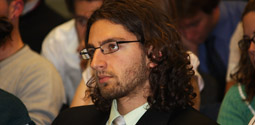 The second day of USAMG commenced with a seminar held by Dr. Josef Braml from the German Council on Foreign Relations (DGAP) in Berlin's Amerika Haus. As editor-in-chief of the Council's annual publication 'Jahrbuch Internationale Politik', and having worked extensively as a researcher and advisor for both the German and U.S governments, Dr. Braml is a leading authority on transatlantic politics and was well placed to offer the group of young leaders an insight into the role of transatlanticists within independent think tanks.
The second day of USAMG commenced with a seminar held by Dr. Josef Braml from the German Council on Foreign Relations (DGAP) in Berlin's Amerika Haus. As editor-in-chief of the Council's annual publication 'Jahrbuch Internationale Politik', and having worked extensively as a researcher and advisor for both the German and U.S governments, Dr. Braml is a leading authority on transatlantic politics and was well placed to offer the group of young leaders an insight into the role of transatlanticists within independent think tanks.
Dr. Braml spoke enthusiastically about the freedom that his profession allows in occupying the middle ground between academia and politics, demanding independent research and publication, political consultancy and also an active engagement with the media. Whilst a traditionally 'independent' German think tank would be primarily state funded – and therefore free from the scrutiny of private financiers - the DGAP is based on the U.S. understanding of 'independent' as mostly funded by private donors (75%). Dr. Braml explained how his job involves examining the domestic determinants of U.S. foreign policy and predicting how decisions taken across the pond will affect Germany. For example, the halting of student exchange programmes involving the States was one of many repercussions of tightened immigration laws post-September 11th 2001. He also foresaw turbulence in USA-German relations in spite of President Elect Barack Obama's outward-looking political stance due to potential 'protectionist' sanctions imposed on foreign trade. One area in which Dr. Braml is hopeful, however, is that German innovation in the blooming renewable energy sector will prove attractive to the United States and result in productive partnerships between the two nations.
The American and German participants were keen to contribute to the discussion, with one young German leader asking the extent to which Cultural Diplomacy plays a role in think tank activity. Dr. Braml responded by saying that Cultural Diplomacy "is not just artsy-fartsy - we must know about business, political science, economics, philosophy and literature. Those participating in Young Leaders Forums like this one are those who will sit in the political administrations and Congress in the future".
From the Amerika Haus the group moved on to the impressive setting of the Berliner Philharmonic, where they learned about the educational focus of the Berlin Philharmonic Orchestra from Project Director of the education programme, Larissa Israel. Boasting one hundred and twenty five years of 'philharmonische Geist', the arrival of conductor Sir Simon Rattle in 1987 has transformed the once elitist institution into a socially conscientious, high-profile agent of Cultural Diplomacy. Sir Rattle has long stressed the value of music as a tool, a universal language that can build bridges where they are much needed: since 2002, a total of 60 different projects have brought members of the orchestra into a setting – a school, prison or theatre, for example – for a series of improvisation workshops with the ultimate aim of putting together a performance that is presented to the public and creating long-term partnerships between individuals and organisations.
The various projects are a challenge for both the orchestra and group members. Ms. Israel explained how the musicians must often endure a steep learning curve, discovering how to communicate their ideas and work with people from different social strata, with people in schools and prisons who may never have touched a musical instrument. A principal goal, then, is to break down fears on both sides.
The USAMG group was shown two short documentary films about past projects and given the opportunity to ask Ms. Israel more about the work of the education programme before moving to the central area of the building to listen to the lunchtime concert, Brahms' Piano Quartet No. 1 in G Major.
The group moved from the Berlin philharmonic to Berlin's Amerika Haus for their afternoon workshops. After a brief introduction from Justin Sikora, the USAMG participants were divided into nine groups and given different discussion topics and prompt questions on the subject of art and music in Germany and the USA and their influence on one another. This gave the young leaders the opportunity to chat informally, exchange ideas and to ask their transatlantic counterparts about how their impressions of Germany and North America are shaped by audio and visual media.
A spokesperson from each group then reported back about what had been discussed and a broad range of themes emerged. The notion that American culture is 'taking over' was refuted by the first group, for example, who claimed that Germany could be viewed as a 'willing marketplace' that had welcomed American music and culture as a symbol of economic and social success after World War II. Participants also spoke about Hip Hop as a medium that transcends ethnic differences and that has been successfully imported into Germany. In terms of art, graffiti was identified as one art form that valued higher in Germany than in the USA, indeed the top graffiti spray paint in North America is made in Germany and exported across the pond. An interesting point of argument were the various reactions to the Berlin Philharmonic's Education Programme as outlined earlier in the day by Larissa Israel; the U.S. participants were optimistic about the transformative potential of outreach schemes, citing the 'American Dream' that regardless of social status, such opportunities afforded to individuals can make a significant difference. Some, however, felt that the German education system - whereby school children are separated by ability from grade 5 onwards, effectively determining their educational and career path at an early age – denies the programmes any sustainable influence. The presentations were met with interest and sparked a number of subsequent debates.
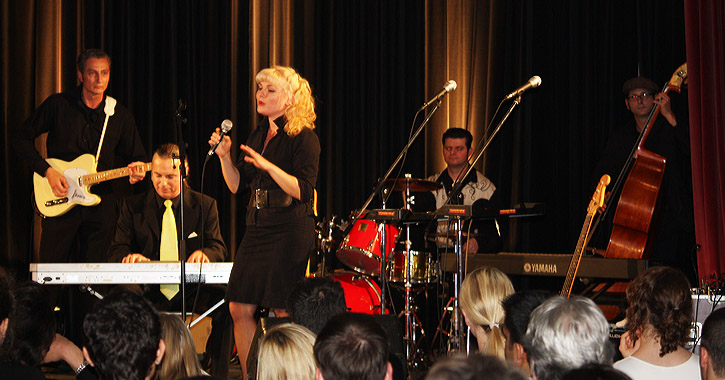
Music Event
American Music Abroad Night
The day culminated with an interactive musical event that explored the influence of American music abroad. Held at the Amerika Haus, members of the public were invited to join employees of the Institute for Cultural Diplomacy, the Bundeszentrale für politische Bildung, Jazz Radio and the visiting participants of USAMG for an evening that combined critical discussion and entertainment, offering fresh perspectives on how music has become one of America's most important cultural exports. The panel included Kara Johnstad (singer/songwriter), Reggie Moore (Jazz Ambassador), Prof. Peter Weniger (Universität der Künste), Matthias Kirsch (Jazz Radio) and Mark Donfried (ICD founder). Mr. Donfried guided the panellists from one genre to the next, from Rhythm and Blues to Jazz, to Rock 'n' Roll and Outlaw Country music, with musical interludes from Guitar Crusher, Reggie Moore, Prof. Peter Weniger, Hannes & Julie Sue and Jamestown Ferry that served to illustrate each of the preceding discussion parts. The panellists were all avid fans of Jazz, commenting on how it has captured the imagination of people all over the world. For example, whilst black Jazz musicians were banned from producing their own records in the United States, they were playing on the most prestigious stages in France. Decades later Jazz provided a window into 'the other side' for East Germans listening to the West German allied radio stations. Both the music and conversation were well received, and the audience was invited back to the auditorium for a concert after refreshments were served in the foyer. The dancing went on into the early hours; a sure sign of a successful party.back
Report of Day 3
Deutsche Welle and the American Chamber of Commerce
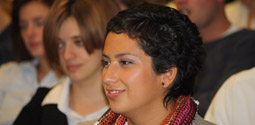 USAMG began on Wednesday morning back in Berlin's Amerika Haus with a talk by Christoph Lanz, head of Deutsch Welle TV (DW-TV). As part of his introduction Mr. Lanz described the origins of what he understood as cultural or public diplomacy as being born out of the post Cold War era in which the new political situation required relationships no longer based solely on hard power to be forged.
USAMG began on Wednesday morning back in Berlin's Amerika Haus with a talk by Christoph Lanz, head of Deutsch Welle TV (DW-TV). As part of his introduction Mr. Lanz described the origins of what he understood as cultural or public diplomacy as being born out of the post Cold War era in which the new political situation required relationships no longer based solely on hard power to be forged.
Talking about the original aims of DW-TV following its launch in 1953, Mr. Lanz described the necessity for Germany to show itself in a positive light to the rest of the world following World War II as it was no longer perceived as being part of the civilised world. Hence, DW took a different approach to most other broadcasters and aimed to re-introduce Germany - how it thinks, how it behaves and how it has changed - in order that people could make up their own minds about the country based on an informed source. DW-TV has never just been about reaching German citizens living abroad, but about connecting with people across the world.
Mr. Lanz then illustrated how DW-TV was developing, particularly in response to the events of 9/11 and the growing need for cultural bridges between the Middle East and Europe, by broadcasting twelve hours a week in Arabic. This mirrors the move in 1995 to broadcast in Spanish alongside the core languages of German and English in order to target South American viewers and to cater for this continent's growing interest in Germany and Europe.
To a certain extent, Mr. Lanz explained, the main aims of DW-TV remain the same, although under a new motto: "Aus der Mitte Europas" (From the heart of Europe). This illustrates perfectly DW's position as presenting Europe to the rest of the world. Importantly, Mr. Lanz also explained how government-funded DW manages to operate independently. Providing that the programmes are in line with the mission statement, Mr. Lanz has the authority to broadcast them. It is only once they have been broadcast that a governmental board may review them.
A lively question and answer session followed with questions being raised about the name of Deutsche Welle. If DW-TV aims to represent European culture, then why not, logically, call it 'Europäische Welle'? Mr. Lanz's response involved a fun comparison with the story of the Trojan Horse. The 'horse' arrives disguised as a European horse, but is actually filled with Germans. In other words, DW-TV presents Europe, but with a distinctly German flavour.
The talk led nicely into the workshop concerning the presentation of Germany in the US. The group was split up once again into nine sub-groups that each spent forty-five minutes tackling a question considering the role of various German cultural institutions operating in the US. The young leaders came up with interesting ideas, highlighting the role of history in shaping perspectives and therefore expressing the need in Germany to learn about, for example, history beyond the declaration of American Independence and in the US, to look beyond the events of World War II. A series of short presentation of each groups' findings followed and drew the first session of the afternoon to a close.
After the workshop at the Amerika House, the day took a more economic direction as the group headed towards Haus der Deutschen Wirtschaft (the House of German Business) in order to participate in a conference organised as a joint initiative between the American Embassy in Berlin and the American Chamber of Commerce in Germany (AmCham), which was hosted by Mr. William M. Timken, Jr., the American Ambassador to Germany. The conference began with a welcome address from Jürgen R. Thumann, the President of the Federation of German Industries. He started off by outlining the intricacies of the German-American relationship and emphasised the deeply shared interests and values the two countries share. The U.S.-German partnership has on many occasions been characterised as one that is fading away, with the two countries having already drifted apart. Yet according to Mr. Thumann, the bilateral relationship is as strong and vibrant as ever. The fundamental economic ties that bind Germany and the United States have grown since the reunification of Germany; the economic integration that the two countries are witnessing at the moment is unprecedented and this momentum has to be contained. 'Strengthening transatlantic relations is an imperative for Germany', Mr. Thumann pointed out.
Mr. William M. Timken, Jr. who is the foremost promoter of transatlantic integration echoed these sentiments. Being a renowned businessman himself, he immediately cut to the chase. He talked elaborately about the current state of the global economy and how Germany's and America's economies will eventually deliver international solutions in order to address problems that the world is currently facing. According to Mr. Timken, the economic interdependency between Germany and the US is the least understood and most underestimated facet of US-German bilateral relations. He emphasised the fact that the existing partnership has become vital for global growth in terms of boosting world prosperity as well as stability, and in many ways defines the nature of transatlantic integration.
On a more pessimistic note, Mr. Carl Graf von Hohenthal, Head of the AmCham Regional Committee of Berlin-Brandenburg, noted that the current situation ought not to be glamorised but taken at face value. He pointed out the need for constructive criticism in terms of dealing with the economic recession, and controversially remarked that the Ambassador was being too optimistic about the repercussions on the German-US relationship.
The introductory addresses were followed by a panel discussion. The six panellists were eminent economists, academics and policy makers: Dr. Karl-Ernst Brauner (Director General, External Economic Policy, Federal Ministry of Economics and Technology), Dr. Michael Burda (Professor of Economics, Humboldt University), Dr. Stormy-Annika Mildner (Research Fellow, German Institute for International and Security Affairs), Dr. Arend Oetker (Vice President, BDI, Managing Director, Dr. Arend Oetker Holding) and Robert Pollard (Minister Counsellor of Economic Affairs, U.S. Embassy Berlin). Dr. Melinda Crane, a distinguished journalist currently working for Deutsche Welle, moderated the panel.
The discussion concentrated mainly on the ramifications of the global financial crisis and on what the exact consequences for Germany and the United States might be. When asked whether the crisis might trigger a wave of protectionism, the panellists agreed that this should not be the case. Whereas Dr. Pollard expressed his faith in political institutions at tackling the crisis, Dr. Mildner was less certain about states' willingness to deal with external problems; the emphasis will first and foremost be on tackling domestic issues. Yet Dr. Burda asserted that the free market has a remarkable ability to surprise us and thus one needn't worry too much about it, as long as economic reasoning prevails.
Another hotly debated topic was the question of decoupling. Dr. Mildner pointed out the reason why Europe hadn't been suffering as much as the US came down to trade agreements between European countries. In the short term this has proved to be a viable solution but, according to Dr. Mildner, the long-term ramifications might be visible in the near future. Dr. Brauner echoed these sentiments by saying that decoupling is essentially 'nonsense'.
The prevailing sentiment throughout the discussion was the call for concerted action. Rather than laying the blame on the United States, Europe should exercise effective crisis management and create more trust. A globally engineered initiative would be a solution for the current crisis. In addition, the EU and the US have an important role to play in determining the extent international regulation should influence financial markets.
One of the concluding and most memorable remarks was made by Dr. Mildner. She pointed out that a crisis is a terrible thing to waste. It will, after all, create fertile ground for reforms. Dr. Burda broadened this idea, and emphasised the fact that this was a great opportunity to decide the future nature of the global financial landscape.
The conference thus ended on a very positive note with the panellists and the audience accepting the challenges that lay ahead, and also appreciating the possibilities they offers us in terms of potential reforms. The conference ended with a lovely reception that created a great possibility for the Young Leaders to converse and acquire new acquaintances. The socialising continued at the World Language Party on the Eastern Comfort Boat, which concluded the very busy and intellectually stimulating day.
back
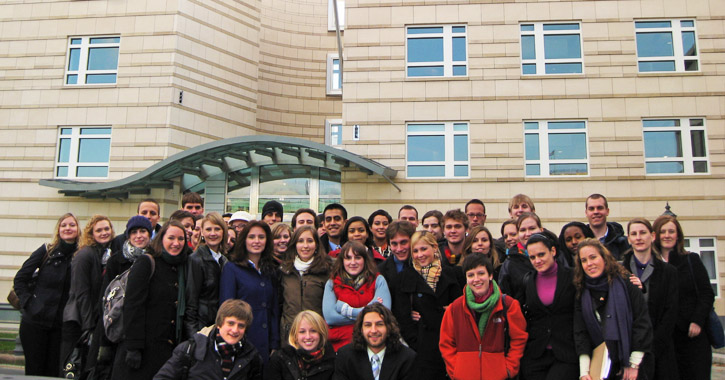
Report of Day 4
The Fulbright Commission and the American Embassy (Workshops: The American Embassy)
The fourth morning began with the participants learning about the Fulbright Commission at the Rotes Rathaus. Reiner Rohr from the Commission spoke at length about the program and the meaning behind the exchanges that the commission does between Germany and the US. Questions from the participants helped clarify the issues regarding funding, competitiveness and reliability of the program to actually improve bilateral ties between the countries.The Fulbright Commission, funded by the governments of both countries gives students, teachers and university academics a chance to travel to the other country to learn and immerse themselves in the culture, as well as further their academic reach. A quick lunch break and short queue later, and the participants were greeted by the charismatic and witty Peter Claussen, who heads the Cultural Attaché at the American embassy. Mr Claussen spoke about his experience as a diplomat in countries like Pakistan, Sri Lanka and Nairobi and the stark differences between these countries and working in Germany. He also captured everyone's interest with his fascinating anecdotes about working for the embassy during the time when Germany was divided. His spirited manner and attention to detail kept the participants engaged, and he managed to capture the feelings of the participants towards Cultural Diplomacy when he admitted that "Probably there is more going on than I can keep track of."
The discussions and meetings held earlier were continued in the workshop that followed the visit to the American Embassy. The participants and the USAMG team were split into groups and given various questions pertaining to the themes of the day to discuss. The questions varied from the participants' opinions on the architecture of the embassy, to how the Embassy dealt with anti-American sentiment. The diversity of the topics enabled everyone to get a glimpse into the various issues the forum had dealt with thus far.
The day was concluded with a panel discussion led by Mr. Sikora, which looked at "Virtual communities and Cyberculture in Transatlantic Communities" and included as panellists Professor Martin Klepper (American Studies Professor at Humboldt University), Jan-Freidrich Kallmorgen (Co-director of Atlantische Initiative e.V, Berlin, The Online Community Atlantic think-tank), Scot Stevenson (Reuters & 'US erklaert' blogger) and ICD Director & Founder Mark Donfried. They exchanged perspectives on what was an engaging discussion on the use of cyberspace and how it influences and shapes relations. The knowledge that the speakers brought to the table was vivid and put in a witty manner, which encouraged comments and challenges from the USAMG participants. Themes ranging from cyber-security to video games as diplomacy tools to self-censorship were discussed.
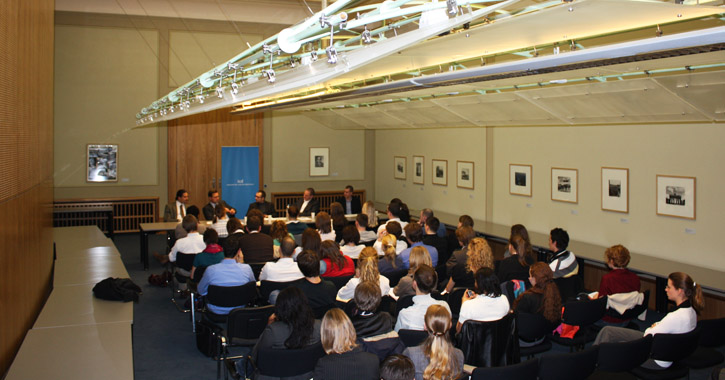
back
Report of Day 5
Follow-up Initiatives
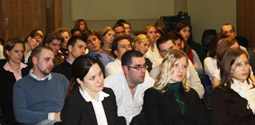 On the fifth day the participants came together at the Amerika Haus for a final session. They had the opportunity to turn their experiences of the past week into ideas for follow-up initiatives. They broke up into small groups to discuss amongst each other how they in the future could use cultural diplomacy to improve the transatlantic relationship. For two hours the Young Leaders debated their proposals amongst each other, before stepping forward and presenting their outcomes to the entire group.
On the fifth day the participants came together at the Amerika Haus for a final session. They had the opportunity to turn their experiences of the past week into ideas for follow-up initiatives. They broke up into small groups to discuss amongst each other how they in the future could use cultural diplomacy to improve the transatlantic relationship. For two hours the Young Leaders debated their proposals amongst each other, before stepping forward and presenting their outcomes to the entire group.
Whereas some groups produced more general ideas to improve relationships between schools, others came up with very concrete plans. One group thought of the classic road trip through the USA as the best way of showing the diverse culture of the country. With sustainability as a key principle, a group of German and US youths could travel together in a climate-friendly bus. In every town they visited the participants of this innovative program could experience the local culture. The Young Leaders working on this idea already had come up with marketing and fundraising strategies.
The next group thought of a more modest but easily implementable plan to display other cultures in either Germany or the USA. The suggestion was to have exchange students portray the country they were studying in by taking pictures of the culture as they experienced it. The study abroad offices could then organize exhibitions depicting the variety of cultures their students were engaged with. As part of a competition, the best photos could be combined in a calendar.
One group of Young Leaders wanted to bring minorities from different countries together. They were disappointed, for example, that no Germans of Turkish descent or Americans of Hispanic descent had taken part as participants. In order to tackle this problem they first evaluated the strengths and capabilities of the team members and divided the roles accordingly.
Overall, the Young Leaders came up with creative concepts. Sometimes they were very ambitious, sometimes practical and down to earth; all were ideas that potentially could use cultural diplomacy as a tool to educate about other cultures. The USAMG team hopes that the participants will endeavour to configure their ideas into real initiatives. They would be a valuable contribution to the work that is already being done within the field of Cultural Diplomacy, and in US-German relations in particular.
back

